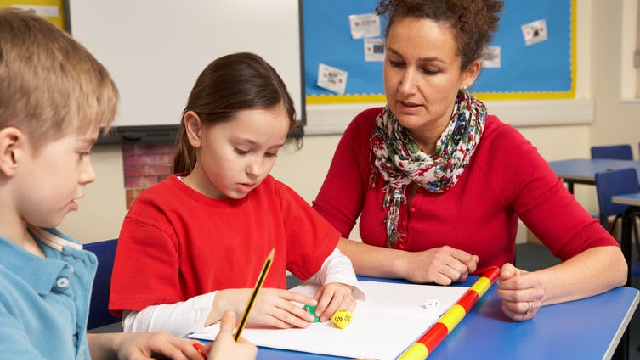With a growing body of research around maths anxiety, tackling it in the classroom is becoming more important. Associate Director of The Victoria Institute, Claire Brown, discusses the research and suggests strategies educators can use in their maths teaching to boost students’ confidence and progress in maths.
Word Count: 1277

In this series, Better Teachers, we’ll explore how to improve teacher education in Australia. We’ll look at what the evidence says on a range of themes including how to raise the status of the profession and measure and improve teacher quality.
“I’m just so bad at maths!” Too often we hear that claim uttered in fear and frustration.
It’s not just students who say this, but also their parents and, in some cases, their teachers, particularly in primary schools.
Research on the topic of maths anxiety is inconclusive and scarce. But there are a few things we know.
A recent study found that “maths anxiety and maths performance can influence one another in a vicious cycle”. Research is unclear as to whether poor maths performance triggers maths anxiety, or whether maths anxiety reduces maths performance. It seems likely to be a combination of both negatively reinforcing each other.
Psychologists have found there can be a very real physical response to maths in both adults and children. This includes the release of stress hormones like cortisol, which are characteristic of the fight or flight response.
One study even found that anticipating a maths test activates the brain’s “pain matrix” – the regions that might light up if you had injured yourself.
It is an affliction that appears to affect females more than males. Cultural expectations may be to blame – girls are more likely to catch maths anxiety (particularly from female teachers), perhaps because of stereotypes that girls are “not very good” at maths.
What works in maths teaching?
When maths teachers see students struggling, they often give more of the same work, rather than going back and plugging the hole or gap in understanding.
No matter what age the student, before moving on, the teacher should always go back to the preceding skill, or take the concept back to the hands-on concrete phase, until the student has confidently mastered that skill or concept.
- Learning the language of maths
It is important to teach children that maths is a language of its own. If students can’t speak the language of maths fluently, they don’t really understand the fundamental concepts.
Sentence frames, co-operative learning tasks and frequent problem-solving linked to real-world examples ensure students “talk” maths fluently and accurately to gain mastery over the language of maths.
Using a sentence frame such as “A ______ has four sides and four corners” or “one metre is equal to ___ centimetres” during warm-ups or plenary sessions allows students to develop fluency in maths vocabulary and a deeper understanding of the targeted mathematical concepts.
- More emphasis on formative assessment
To reduce maths test anxiety, teachers should put more emphasis on formative assessment – on-the-spot monitoring and feedback – rather than relying mainly on summative assessment where a student is assessed at the end of a period of learning.
Giving specific, purposeful and timely feedback to maximise learning opportunities is more effective than missing key learning opportunities waiting for children to fail an end-of-unit assignment.
- Mastering maths concepts
Being able to give students many opportunities to practise and master the concrete, pictorial and abstract phases of development for each maths concept is essential for them to learn successfully.
- Understand which level each student is at
Some research suggests that girls rely more on manipulatives – using concrete materials to support their problem-solving – and that boys move on more quickly to mental cognitive strategies, such as mental strategies like doubles or bridge to ten.
Regular, informative assessment ensures the teacher has evidence of what each student knows and what they need to learn next when they are ready to move on.
- Adapt teaching and resources
Effective maths teachers are able to differentiate their teaching practices, curriculum and resources to ensure all students are accessing the maths curriculum, feeling sufficiently challenged, but not overly anxious, and working to grow their potential in learning maths.

Do we need specialist maths teachers in primary school?
In some states, such as New South Wales, there is a move to appoint specialist maths teachers in primary schools.
On the surface, this appears to be a tempting solution to raising student performance in maths, but what is the price to be paid?
The primary school system of the generalist classroom teacher intentionally differs from secondary schooling in order to meet the social and emotional needs of young children, as well as their academic needs.
Generalist teachers take responsibility for developing the whole child. A focus on coaching and feedback for primary teachers to improve their mathematics instruction would ensure the learning of maths remains the responsibility of everyone in a school. It would also combat the myth that some people simply can’t do maths.
The federal government has committed A$54 million over four years to the Investing in Science and Maths for a Smarter Future initiative. In 2012, the Office for Learning and Teaching funded five research projects on the teaching of maths and science. These projects were funded in response to recommendations from Ian Chubb, then Australia’s chief scientist, in his 2012 report Mathematics, Engineering and Science: in the national interest.
One of these projects focuses on the training of specialist maths and science teachers in primary and secondary schools. Findings from these projects are due to be delivered in 2017.
Confident maths teachers, confident maths students
Not all students will enjoy learning maths. But this is more likely to happen if maths is well taught from early childhood. And the key to confident maths students is confident teachers.
An instructional practices survey at a primary school in Western Australia found that 40% of teachers believed their confidence in teaching maths would benefit from explicit coaching and feedback.
In response to this, the school maths leadership team designed a series of professional learning sessions to build staff confidence; created mentors for other staff members to help reduce their levels of anxiety about teaching maths; and ran workshops for parents every few weeks to inform them of the latest research in maths, the common areas that children are having difficulty with, and provide practical ways that parents can support their children’s maths learning at home.
By informing parents about key maths skills children are learning at school, teachers showed parents how everyday home activities, such as cooking and shopping, can help reinforce mathematical thinking.
Parents were made aware of the subliminal messages they might send to their children when they say things like, “It’s ok you’re no good at maths, because I wasn’t either.” Parents were then given alternative language to use with their children when they talked about maths.
As a result, teachers and parents at the school have gained confidence in their ability to teach maths and this is reflected in the students’ learning and attitude to maths.
The school is analysing a range of data to see how improving students’ confidence in learning maths can translate to improvements in maths performance.
Research from the Grattan Institute reinforces the point that teachers and schools need to collect and use evidence of students’ learning achievements and progress over time to know what works to improve student learning and to change what doesn’t.
Top tips for improving teaching in maths
To improve maths teaching, teachers should do the following:
- If they suffer from maths anxiety, don’t suffer alone. Identify the sources of anxiety and seek help from mentors and coaches to improve knowledge of maths concepts. Then use this expertise to build a broader repertoire of effective maths teaching strategies.
- Demonstrate a growth mindset to students in their attitude towards teaching and learning maths.
- Over time, regularly collect and analyse a range of evidence for each student’s individual achievement and progress to understand what each student knows and what they are ready to learn next.
- Join a professional maths teaching association and/or professional learning community to engage in regular discussion with other teachers about what teaching strategies are working for particular students and what are not.
This piece was co-authored by Jacki McMahon, teacher at Makybe Rise Primary School and recent winner of a national ChooseMaths 16 teaching award, and Steph McDonald, principal of Makybe Rise Primary School in Western Australia.
Read more articles in the series![]()
Written by Claire Brown, Associate Director, The Victoria Institute; National Director, AVID Australia, Victoria University
This article is republished from The Conversation under a Creative Commons license. Read the original article.





